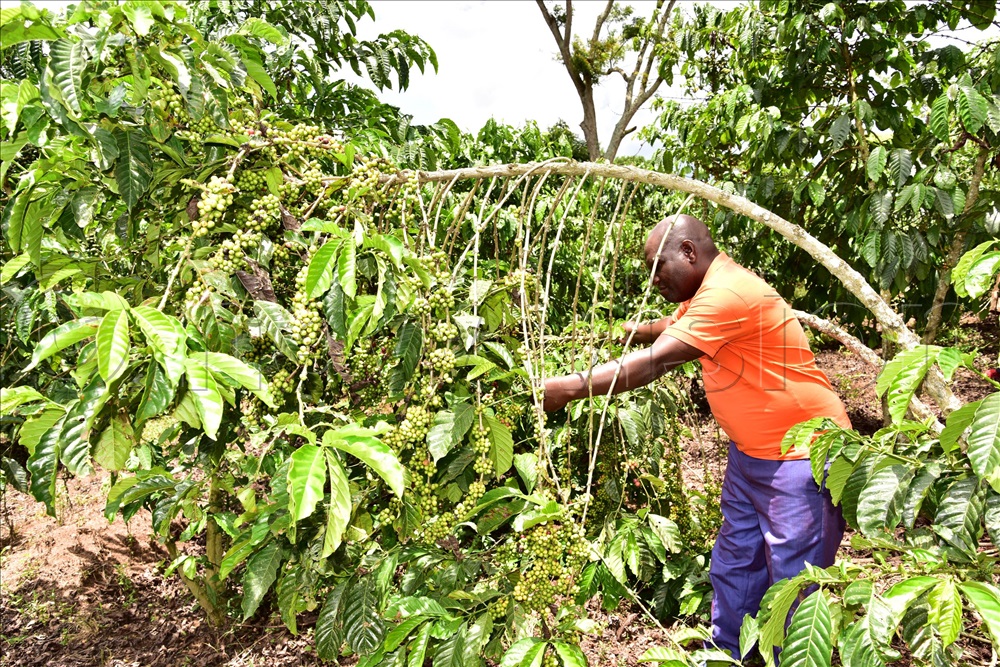By Umar Nsubuga
World Coffee Day, celebrated every 01st October, provides an opportunity for the world to reflect on the journey of coffee, from the farm to cup.
Among those making a significant impact is Yekosefati Sekabembe, a renowned coffee farmer from Kiyunga, Naluwonga parish in Mubende district, Uganda.
Specialising in organic coffee farming, Sekabembe has gained widespread recognition for his dedication to producing high-quality beans without the use of chemicals.
With over two decades of experience, he has built a successful career and developed one of the largest coffee farms in the area.
His methods not only result in superior flavour but also promote environmental sustainability, positioning him as a key figure in Uganda’s coffee industry.

A firm advocate of organic practices, Sekabembe believes that organic coffee farming is the future for commercial farmers in Uganda.
He emphasises the numerous benefits of going organic, explaining why it’s the best choice for farmers seeking long-term success.
Why organic coffee matters
According to Sekabembe, organic coffee farming is not just a trend; it’s a sustainable solution that offers numerous benefits for both farmers and the environment.
Organic farming avoids synthetic chemicals, pesticides, and fertilizers, relying on natural inputs to maintain soil health and plant growth.
“Organic coffee farming promotes the health of the soil, which is the foundation of any successful farm,” Sekabembe explains.
“By using organic manure and compost, we enrich the soil with nutrients, ensuring that the coffee plants grow strong and healthy without depleting the land over time.”
Sekabembe adds that organic farming also helps preserve biodiversity.
“When you farm organically, you’re working with nature rather than against it. This means fewer pests, more beneficial insects, and healthier crops overall.”
The market demand for organic coffee
Sekabembe highlights that the global demand for organic coffee is on the rise, driven by consumers who are increasingly conscious of health and environmental issues. More people are willing to pay premium prices for coffee that is produced without harmful chemicals, making organic coffee a lucrative market for commercial farmers.
“Consumers, especially in Europe and North America, want coffee that is both good for them and the environment,” Sekabembe notes.
“As a commercial farmer, this demand presents an opportunity to tap into a profitable market while doing something good for the planet.”
Sekabembe’s organic coffee farm has attracted buyers from various parts of the country and even abroad.
He points out that being certified as an organic coffee producer can open doors to export markets where organic products fetch higher prices.
Health and quality benefits of organic coffee
Organic coffee is not just better for the environment, it’s also better for the quality of the coffee itself.
Sekabembe explains that organic coffee tends to have a richer, more robust flavor because the plants are grown in natural conditions, free from artificial additives.
“Organic coffee beans have a distinctive taste because they are grown in healthy soil. The absence of chemicals allows the natural flavors to come through, which makes for a superior cup of coffee,” Sekabembe says.
He adds that organic coffee is healthier for consumers since it’s free from chemical residues.
“People are becoming more health-conscious, and organic coffee gives them peace of mind, knowing that they are consuming something pure and natural.”
Sustainability and long-term profitability
One of Sekabembe’s strongest arguments for organic coffee farming is its sustainability.
He believes that farmers who adopt organic practices can enjoy long-term profitability because organic farming methods protect the land from degradation, ensuring that future generations can continue to farm on it.
“Organic farming is about sustainability,” he says.
“You can’t continue using chemicals year after year without damaging the soil. Eventually, the land becomes infertile, and you’ll have to spend more money trying to fix it. With organic farming, you keep the soil fertile for the long term, which means you can farm for decades without exhausting the land.”
Sekabembe emphasises that organic farming is also cost-effective in the long run. Although organic methods may require more labor upfront, they reduce the need for expensive chemical inputs. Over time, this leads to higher profits and more stable yields.
Challenges and solutions in organic coffee farming
Despite the numerous benefits, Sekabembe acknowledges that organic coffee farming comes with its own set of challenges.
Organic farming often requires more labour for tasks such as weeding and pest control. Additionally, farmers need to be patient, as organic coffee farming can take longer to yield results compared to conventional methods.
“To succeed in organic coffee farming, you need to be committed and patient,” Sekabembe advises. “It takes time to see the full benefits, but once the system is in place, the rewards are worth it.”
Sekabembe also notes that getting organic certification can be a hurdle for many small-scale farmers, as the process can be lengthy and expensive. However, he encourages farmers to work together through cooperatives to share the costs and benefits of certification.
“Forming farmer groups or cooperatives is a great way to overcome these challenges,” he says. “When farmers come together, they can pool resources, share knowledge, and even market their organic coffee more effectively.
“Organic coffee is the future,” Sekabembe says confidently.
“If more farmers start growing organic coffee, we can position Uganda as a leader in the global coffee market. It’s good for the environment, good for our health, and good for business.”





